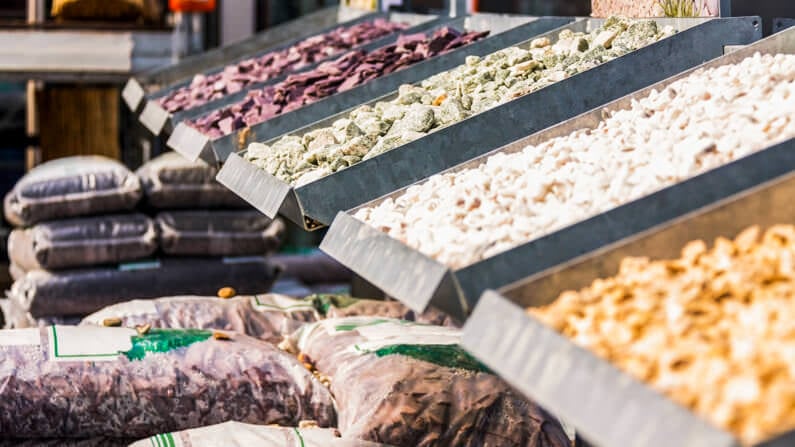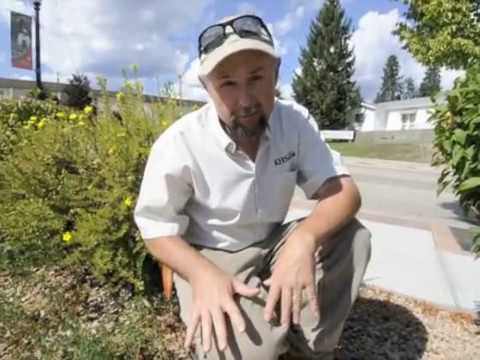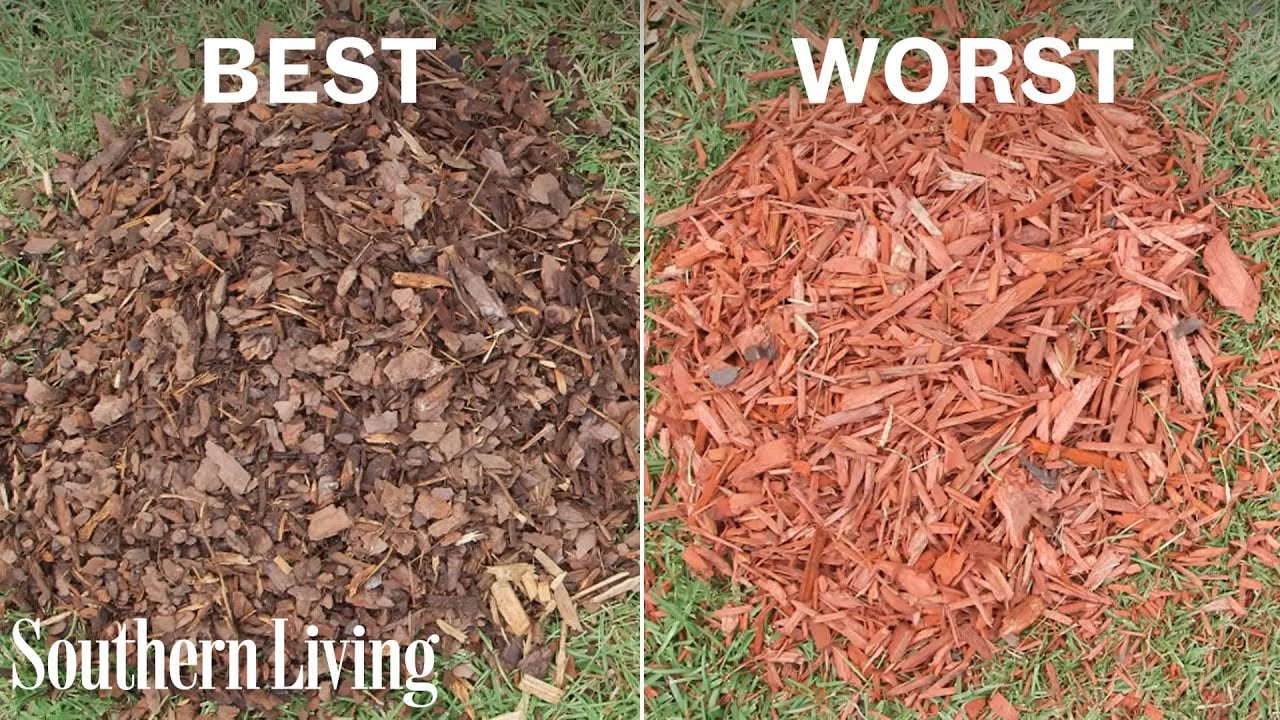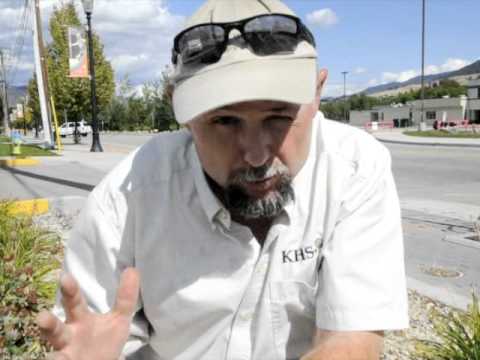Inorganic Mulch: How to Choose the Best One For Your Garden
Is inorganic mulch ever a better choice than organic mulch for your garden? It depends – maybe you need a mulch that doesn’t blow away in high winds, float away in heavy rains, or burn your house down.
Newsflash! All organic mulches are flammable.
But rock or stone won’t burn. So they’re the best type of mulch to use next to structures.
There are advantages to some types of inorganic mulch, y’ know, like that non-flammable thing.
But the cons of inorganic mulches generally outweigh the pros. So it pays to learn as much as you can before choosing an inorganic mulch.
Not sure if an inorganic mulch is the best type of mulch for you? Learn how to choose the right type of mulch for your garden.
If you’re considering using inorganic mulch in your yard or garden, I’ve got you covered.
I’ve reviewed seven different kinds of inorganic mulches, and I tell you what I recommend and what I don’t.
BONUS: Download my free printable as a bonus for joining my newsletter: Mulch Comparison Chart: Pick the best mulch.
Heads up: I’ll earn a small commission if you buy something after clicking a link in this post. I only link to products I’d recommend to my best friend.

What is inorganic mulch?
Inorganic mulch is either man-made or mined. Rubber mulch, plastic sheeting, landscape fabric, or rock mulch are all types of inorganic mulch.
Advantages and disadvantages of inorganic mulches
What are the benefits of inorganic mulch?
- Some inorganic mulches such as rock, stone, or gravel are fire-resistant.
- Inorganic mulch doesn’t break down like organic mulch does. Since it’s long-lasting, it doesn’t need to be replenished very often. And in some cases, not at all.
- Most inorganic mulches won’t get blown around by the wind.
- Some inorganic mulches are too heavy to float away during heavy rains.
What are the disadvantages of inorganic mulch?
- It doesn’t feed your soil as an organic mulch does.
- Most won’t prevent weeds from growing.
- They’re not maintenance-free. Yep, you still have to weed rock mulches!
- They’re less environmentally friendly than organic mulch because most are made from non-renewable resources.
Two types of inorganic mulch I recommend
1. Rock mulch
Gravel, Crushed Rock, Pea Gravel, River Rock, up to 1.5″ in diameter
Rock, gravel, and stone mulches work well in certain situations.
But you need to understand the downsides to rock mulches before choosing one as your mulch. Typically, the disadvantages of rock mulch outweigh the advantages.
Considering using large river rocks or lava rock? See my reviews below.
Rock mulch is best for rock gardens, pathways, dry creek beds, beds next to buildings in fire-prone areas, landscaping around fire pits, and in trouble-spots where water collects during heavy rains and would wash other mulches away.
If you’re looking for a heavy mulch that won’t wash away, rock mulch may be what you need.
Depth: 2-4 inches, depending on the size of the rock. Apply bigger rocks more deeply.
Advantages:
- Many are attractive, and rocks come in a variety of colors.
- Rock mulch lets water into the soil and prevents the evaporation of water.
- It’s much less likely to float away than other mulches.
- It won’t blow away (unless it’s lava or pumice).
Disadvantages:
- It takes a lot of manual labor to install and remove rock mulch.
- It heats up plants and soil. Excessive use of rock mulch is contributing to the increase in nighttime temperatures in urban areas of the Southwestern U.S.
- It won’t add organic matter to your soil like organic mulches do.
- And it doesn’t suppress weeds.
Yes, people. You heard me! It. Does. Not. Suppress. Weeds.
Pro tip:
Still want/need to use rock mulch? Then don’t install it over landscape fabric – especially if you plan to grow any plants in the rock mulch. See my discussion of the evils of landscape fabric below.
That landscape fabric under your rock mulch is a false sense of security.
Despite the claims of many manufacturers, landscape fabric isn’t a long-term solution for weed prevention, no matter what you top it off with.
Ken from the Grower Coach channel explains why you shouldn’t use landscape fabric under rock mulch:
2. Plastic mulch
Plastic mulch should only be used in vegetable gardens during the growing season.
Plastic mulch is best for heat-loving vegetables like tomatoes, eggplants, melons, and peppers, and warming your vegetable garden soil in the spring.
Advantages:
- It warms the soil for heat-loving crops.
- It suppresses weeds during the growing season.
- It reduces evaporation.
Disadvantages:
- You can only use plastic one time. Re-using plastic mulch can increase problems with soil-borne diseases.
- Plastic mulch has a high environmental cost. It’s a one-use item that gets put into a landfill at the end of the season.
- When you use plastic mulches in your vegetable garden, you must have drip irrigation installed.
Types of Plastic mulch:
- Clear plastic mulch is the best type of plastic mulch to use to warm up your soil in the spring. NOTE: It must be removed before planting. And, it can also be used to solarize your soil. Choose a UV-stabilized plastic so you can use it for several years.
- Black plastic mulch can be used to warm your soil when planting heat-loving crops. It also suppresses weeds.
- IRT plastic mulch heats the soil better than black plastic and also suppresses weeds as well as black plastic. This is my personal choice for heat-loving crops.
- Red plastic mulch isn’t a mulch I recommend. See my reasons below.
Take the guesswork out of choosing the best mulch. Get your FREE Mulching Cheat Sheet now!
Inorganic mulch types I don’t recommend
1. Large river rocks
Why I don’t recommend large river rocks:
- The size of the rocks makes it difficult to weed. As I mentioned before no rock mulch suppresses weeds. And these large stones make weeding even more of a chore than it usually is.
- Like all rock mulch, it doesn’t add organic matter to your soil, it takes a lot of manual labor to install and remove, and it heats up areas around it.
- Large river rocks are almost always out of scale to any plants around them.
2. Rubber mulch
Why I don’t recommend using rubber mulch:
- The safety of rubber mulch is VERY questionable.
- It smells pretty bad (like ground-up tires).
- Weed suppression isn’t as good as what you can get with organic mulches.
- It can attract cockroaches.
- And, just for good measure, it’s highly flammable.
So, just say no to rubber mulch!
The Southern Living channel talks about why rubber mulch is one of the worst:
3. Lava rock or pumice
Why I don’t recommend lava rock or pumice:
Lava rock shares the downsides of all rock mulch, (doesn’t add organic matter to your soil, is a lot of work to install and remove, and it heats up areas around it).
But lava rock has some downsides that are particular to it.
- Lava and pumice have small pores in them, so they absorb water, and don’t release all of it to your plants. So, you end up watering more than you would with regular rock mulch.
- It’s lightweight, so it blows around easily. Because of this, you should place it 1″ below grade to contain it.
- The sharpness of the rocks makes them unpleasant to work around.
4. Red plastic mulch for tomatoes
Red plastic mulch was developed to increase yields for tomato farmers.
Why I don’t recommend using red plastic mulch for tomatoes in home gardens:
- Unfortunately, the research results for red plastic mulch are inconclusive.
- It doesn’t appear to have the benefits of increased yields that the initial research showed.
- IRT plastic mulch or black plastic mulch are better choices for cold-climate or short-season gardeners who want to create the warm soil conditions that tomatoes prefer.
5. Landscaping fabric
Why I don’t recommend using landscape fabric under any mulch:
- Contrary to manufacturers’ claims, the pores in it eventually clog, cutting off air and water to the soil below. This creates an unhealthy soil environment for your plants. Plant roots need air and water to survive.
- Weed suppression quickly declines! A year or two after you install it you’ll find yourself either weeding a lot, spraying weed-killer all over the place, or cursing the day you became the victim of a supervillain with a diabolical plan to cover your yard with weeds – especially if you put it under rock mulch.
- You can’t garden with it. You can’t move plants around, or easily divide perennials.
- It doesn’t add organic matter.
- If you change your mind later, it’s very difficult to remove.
- Birds, such as robins, are less likely to visit your garden beds and hunt for insects like beetles or earthworms.
- When the mulch on top blows off or floats away, it’s butt-ugly!
Ken from the Grower Coach channel explains the myths about landscape fabric:
Frequently asked questions about inorganic mulch
What’s the difference between organic and inorganic mulch?
Want to give your garden a natural boost? Use organic mulches. Since they come from something that was once alive, as they decompose, they slowly add nutrients to your soil. But you need to top them off periodically. In contrast, inorganic mulches like rock mulch don’t break down so they last year after year without needing to be replenished.
Which is more beneficial organic or inorganic mulching?
In most situations, organic mulches are more beneficial. Since organic mulches break down, they can nourish your soil. A thick layer of organic mulch also does a good job of suppressing weeds. Inorganic mulches don’t enrich your soil and don’t prevent weeds. But they may be a better choice when mulching next to structures, or when growing desert-adapted or rock-garden plants.
How long does inorganic mulch last?
Inorganic mulch tends to be long-lasting. A one-time purchase of rock or gravel mulch will transform your garden without you having to worry about replacing it every year.
Can you use mulch for a fire pit?
The best kind of mulch to use around a fire pit is rock, stone, or gravel mulch. These are fireproof and provide the best protection from dangerous sparks from your fire pit.
What kind of mulch is fire safe?
Rock, stone, and gravel mulches are fire safe and are the best kind of mulch to use next to structures. When mulching within five feet of buildings or structures, choose one of these non-combustible mulches.
What is the best inorganic mulch?
Looking for a mulch that will last through any season and stand strong against wind and rain? Rock (or gravel) mulches are the perfect solution! These heavy-duty mulch options have you covered – no matter what Mother Nature throws at them.
Download your free cheat sheet and choose the best mulch
I cover both organic and inorganic mulch in the cheat sheet. You’ll choose the perfect mulch for your garden in three easy steps:
- Focus on what plants you want to mulch.
- Choose the top three things you want this mulch to do for your garden.
- Once you have the answers to those questions, look through the list of mulches to find the perfect mulch for your needs.
The chart includes details about 26 different mulches. They’re grouped by mulches that I:
- recommend
- recommend with reservations, and
- don’t recommend
As a bonus for joining my weekly newsletter, download a free Mulching Cheat Sheet. And choose the right mulch for your yard in 3 easy steps!
Here’s a sneak peek of your printable cheat sheet:

Inorganic Mulch: Your Turn
Are there any types of inorganic mulch that I missed? If so, let me know in the comments, and I’ll add them to the list.





I am retired, 70 yrs. I have 3 large magnolia trees, two 500 sq. ft. beds underneath two of the trees.
Trees drop leaves and seed pods all year long. I want to clear the beds of everything but hydrangeas,
mulch and then be able to easily use the blower to clear the leaves and balls, without losing the mulch.
I see no real alternative except rubber chip mulch….stays put, allows air to the plant roots,
chocolate brown in color, doesn’t degrade, reasonably affordable, and is not rocks, which my wife does not want. Open to other ideas, but I dont really know of any that will be more suitable.